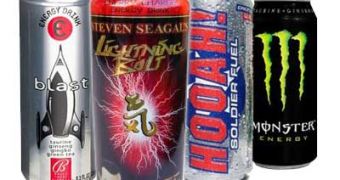In recent years, energy drinks have become part of our daily lives, whether we use them when there's a hard night's work ahead of us, an unfinished project with a deadline the following morning or simply when we're out dancing and want to "last the night", as word goes. Mixed with alcohol, energy drinks make those who consume them less sensitive to the inebriating effects of alcohol. Overall, as one label for such a product claims, they claim to "improve performance, increase concentration and reaction speed, improve vigilance, stimulate metabolism". While all that sounds great, along with their vertiginous climb to the top of our preference list, a series of concerns are also emerging regarding taurine-based energy drinks.
One of the main problems with such drinks is that when they are mixed with alcohol, they mask some of its debilitating effects, thus making people feel "less drunk" - which means that they will be able to stay up longer and drink larger amounts of alcohol than usually. Put in the context of today's alarming rise of the so-called "drinking cultures", this may turn out to be a serious problem. "The symptoms of drunkenness are reduced - but not the drunkenness itself. They [the drinkers] can't tell if they're drunk. They can't tell if someone else is drunk. So they get hurt - or they hurt someone else", warns American Professor Mary Claire O'Brien, who recently published her research into this matter.
As a result, Red Bull - one of the leading players on the worldwide energy drink market - has been officially banned from sale in countries like Norway, Denmark, Uruguay and Iceland. Health departments in France, Ireland, Turkey, Sweden and the U.S. have also expressed their concerns with regard to the negative effects of such drinks. In addition to large amounts of sugar, which can cause everything from obesity to diabetes - energy drinks can also cause us to overdose on caffeine. One can of Red Bull, for example, contains roughly the same quantity of caffeine as a cup of filter coffee or two cups of instant coffee, and as coffee drinkers also know, excess caffeine is not pleasant at all, as it causes insomnia, anxiety and hyperactivity.
Recent studies have discovered a very alarming phenomenon: 30% of children aged 12 regularly consume energy drinks, as do 40% of the youngsters in the 16 to 19-year-old segment. By contrast, only 19% of people aged between 45 and 54 favor them. Energy drinks are aggressively marketed at young people in particular, who in their turn believe that there is nothing wrong in mixing them with alcohol. Red Bull, for example, "sponsors dozens of extreme sports events and cultural events targeted at the young. The drink is associated with dangerous, on-the-edge, adrenaline-fueled activities", claims a survey quoted by the Daily Mail. However, no matter how cool or edgy they may be, energy drinks are a major health hazard and we'd all do well to treat them with appropriate care.

 14 DAY TRIAL //
14 DAY TRIAL //